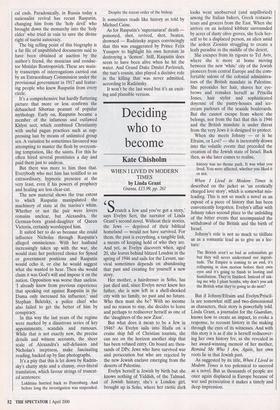Deciding who to become
Kate Chisholm
WHEN I LIVED IN MODERN TIMES by Linda Grant Granta, £15.99, pp. 261 Scratch a Jew and you've got a story,' says Evelyn Sert, the narrator of Linda Grant's second novel. Without their stories, the Jews — deprived of their biblical homeland — would not have survived. For them, the past is everything, a tangible link, a means of keeping hold of who they are. And yet, as Evelyn discovers when, aged 20, she leaves behind blitzed London in the spring of 1946 and sails for the Levant, sur- vival sometimes depends on abandoning that past and creating for yourself a new story.
Her mother, a hairdresser in Soho, has just died and, since Evelyn never knew her father, she is now left in a shell-shocked city with no family, no past and no future. Who then must she be? With no income and no reason to stay, she decides to leave and perhaps to rediscover herself as one of the 'daughters of the new Zion'.
But what does it mean to be a Jew in 1946? As Evelyn sails into Haifa on a cruise ship full of Christian tourists, she can see on the horizon another ship that has been refused entry. On board are thou- sands of DPs: Jews who have survived war and persecution but who are rejected by the new Jewish enclave emerging from the deserts of Palestine.
Evelyn herself is Jewish by birth but she knows nothing of Yiddish, of the Talmud, of Jewish history; she's a London girl, brought up in Soho, where her exotic dark looks went unobserved (and unpilloried) among the Italian bakers, Greek restaura- teurs and grocers from the East. When she arrives on an isolated kibbutz surrounded by acres of dusty olive groves, she feels her- self to be a displaced person, an alien amid the ardent Zionists struggling to create a leafy paradise in the middle of the desert.
She escapes from its rigours to Tel Aviv, where she is more at home moving between the new 'white' city of the Jewish pioneers from central Europe and the com- fortable salons of the colonial administra- tors of the British mandate in Palestine. She peroxides her hair, shaves her eye- brows and remakes herself as Priscilla Jones, hair stylist and sophisticated doyenne of the pastry-houses and ice- cream parlours of the seaside boulevards. But she cannot escape from where she belongs, nor from the fact that this is 1946 and the British mandate is under threat from the very Jews it is designed to protect.
When she meets Johnny — or is he Efraim, or Levi? — she is inexorably drawn into the volatile events that preceded the creation of the Jewish state of Israel. Back then, as she later comes to realise,
history was no theme park. It was what you lived. You were affected, whether you liked it or not.
When I Lived in Modern Times is described on the jacket as 'an erotically charged love story', which is somewhat mis- leading. This is not so much a novel as an exposé of a piece of history that has been conveniently forgotten. Evelyn's affair with Johnny takes second place to the unfolding of the bitter events that accompanied the withdrawal of the British and the birth of Israel.
Johnny's role is not so much to titillate us as a romantic lead as to give us a lec- ture:
The British aren't so bad as colonialists go but they will never understand our ingrati- tude. The Empire is coming to an end, it's collapsing in slow motion before their own eyes and it's going to finish in looting and humiliation. They're finished. Instead of ask- ing me why I plant bombs, why don't you ask the British what they're going to do next?
But if Johnny/Efraim and Evelyn/Priscil- la are somewhat stiff and two-dimensional as characters, their story is powerfully told. Linda Grant, a journalist for the Guardian, knows how to create an impact, to evoke a response, to recount history in the making through the eyes of its witnesses. And with this story it is as if she is herself rediscover- ing her own history for, as she revealed in her award-winning memoir of her mother, Remind Me Who I Am, Again, her own roots lie in that Jewish past.
As suggested by its title, When I Lived in Modern Times is too polemical to succeed as a novel. But as thousands of people are once again displaced in Europe because of war and persecution it makes a timely and deep impression.






















































































 Previous page
Previous page